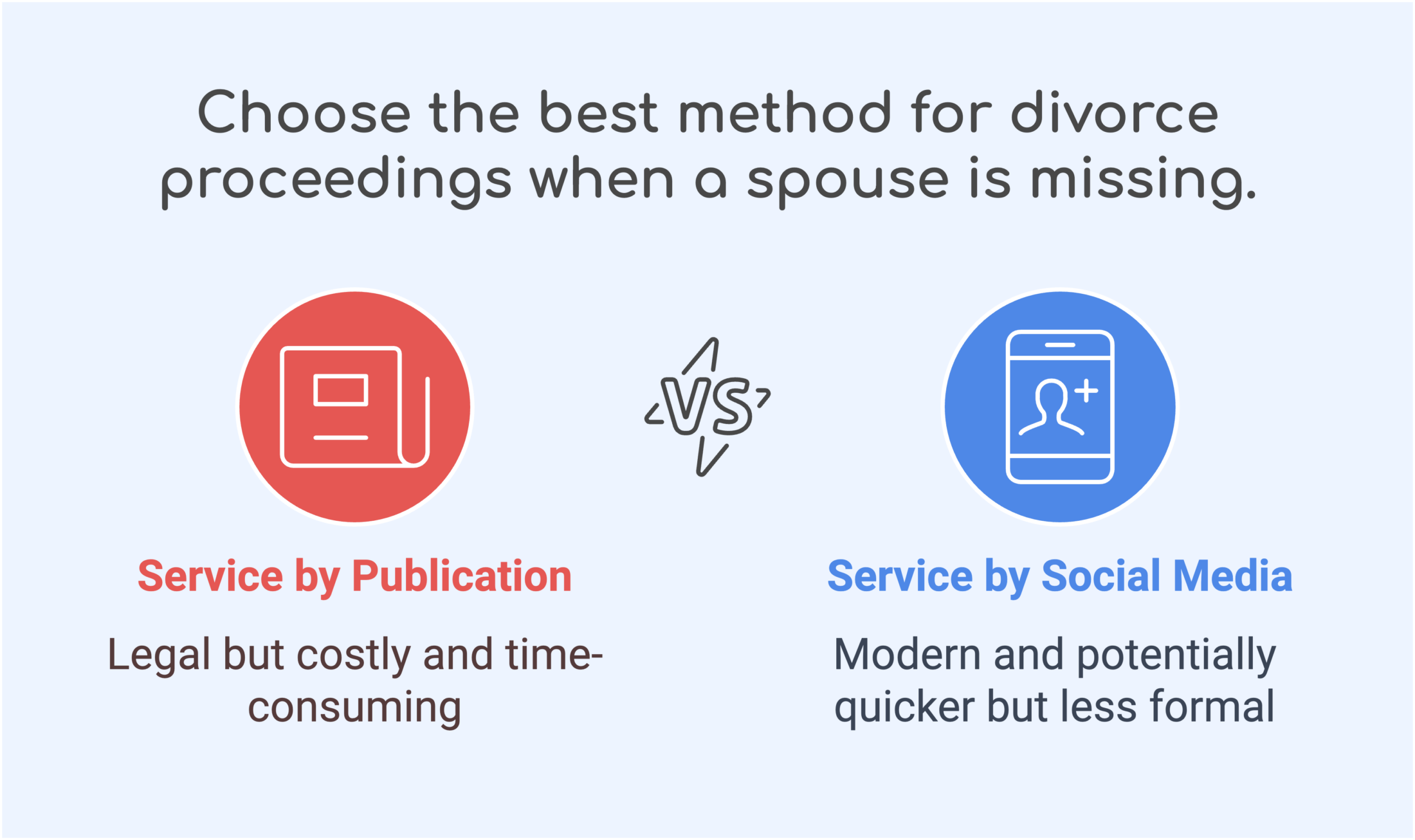A lot of estranged couples lose track of each other after separating. This often leads to situations where one spouse wants to get a divorce but has no idea where the other spouse lives. If you’re facing a divorce in Illinois and can’t locate your spouse, you might wonder how the process can proceed.
Fortunately, Illinois law allows you to divorce a missing spouse, but it requires following specific legal steps. In this article, we’ll walk you through the options available, including service by publication, and how you can move forward with your divorce even when your spouse is untraceable.
Illinois Divorce Process Missing Spouse
In Illinois, the law allows you to move forward with a divorce even if your spouse is missing, as long as you take certain steps to show the Court that you’ve done everything you could to locate them. Generally, when you file for divorce, you must have your spouse served personally. This can be done by having the Sheriff or a process server:
- Deliver a copy of the summons and the Petition for Dissolution of Marriage directly to your spouse, or
- Leave a copy of the summons and Petition with someone else at your spouse’s residence, as long as that person is at least 13 years old. The person serving the paperwork must also tell that person what the papers are and then mail a copy to the same address.
Let’s guide you through the steps and options if you’re seeking a divorce and can’t locate your spouse.
Personal Service When You Can’t Find Your Spouse
Meeting the personal service requirement can feel impossible if you don’t know where your spouse is. In some cases, people marry without knowing each other well and then drift apart, making it difficult to locate them later. Other times, a spouse may leave intentionally, hoping not to be found.
Fortunately, not knowing your spouse’s whereabouts doesn’t mean you have to stay married. Illinois law provides options to help you move forward with a divorce, even if your spouse is missing.
Attempt to Locate Your Spouse
If you want to proceed with a divorce but can’t find your spouse, you must first make every reasonable effort to locate them. We advise our clients to reach out to their spouse’s relatives, friends, or former co-workers to see if they have a contact number. Try calling their last known phone number or workplace to see if they’re still reachable. Social media can also be helpful—checking platforms like Facebook, LinkedIn, and other channels might provide leads on your spouse’s location.
Other options include writing a letter to their last known address to see if it gets forwarded or sending an email if you have an active address.
If these efforts don’t help you find your spouse, you will need to file an affidavit with the Court, detailing all the steps you took to locate them. The Court will review this affidavit to ensure you made sincere efforts. If the Court is satisfied, it will allow you to serve your spouse the divorce proceedings through service by publication.
Service by Publication
Service by publication is a legal process that lets you notify your missing spouse of the divorce by publishing a notice in a newspaper in the area where the divorce action is filed. This notice must include:
- The Court’s name
- The title and number of the case
- Details of the case
- A deadline after which a default judgment may be entered against your spouse
After publication, you must clip a copy of this newspaper notice and mail it to your spouse’s last known address. The notice must appear in the newspaper at least once a week for three consecutive weeks. If your spouse does not respond after three weeks, you can ask the Court to proceed with your divorce. Once thirty days have passed since the last publication date, the Court may grant a default judgment, allowing you to finalize your divorce.
The Court may reserve certain issues, like awarding maintenance or dividing property, until your spouse is located. However, service by publication still allows you to be legally divorced, even if some issues are postponed.
Note: Service by publication can add both time and cost to a divorce. If you prefer, your divorce attorney can handle these steps, but this will increase the overall cost of the process.
Service by Publication Can Be Costly
Service by publication requires extra time and costs compared to a standard divorce. In a standard divorce, service can often be completed within the first thirty days, especially if both parties agree. By contrast, service by publication involves additional steps and expenses. If you prefer, your attorney can handle these steps for you, though this will increase your costs.
Service by Social Media
The Court may allow service by social media if you can show that it was a regular way of communicating with your spouse. To use this option, you must also prove that the Facebook profile (or other social media account) belongs to your spouse and that they use it to communicate.
It’s helpful to attach copies of messages that your spouse posted or shared with friends on their profile. Including these, along with your sworn testimony, can support your request for service by social media. Keep in mind that notifying your spouse of a pending divorce is a serious matter, and the Court strictly enforces its requirements. You must provide strong evidence to meet the Court’s standards for this type of service.
This is a newer method for serving divorce papers when your spouse is missing. An attorney can help you navigate this process and ensure you meet the requirements.
Why It Is Important to Hire an Attorney
Courts in the United States are committed to ensuring that all parties in a case receive Due Process. This means making sure each party is properly “on notice” of any Court proceedings they’re involved in. When you don’t know where your spouse is living, serving notice can be extremely challenging.
Hiring an experienced divorce attorney can help you ensure that notice is served properly, allowing you to proceed with your divorce. A divorce attorney knows the best steps to take, including alternative methods of service, and can guide you through the process, reducing delays and ensuring compliance with Court requirements.
Get Help Divorcing a Missing Spouse
If you are facing the frustration of trying to divorce a missing spouse, Anderson Boback & Marshall has the experience to guide you through every step. Meet our team and contact us today for a consultation and start moving forward.
FAQs on Divorcing a Missing Spouse in Illinois
Can I get a divorce if I can’t find my spouse?
Yes, you can get divorced in Illinois even if your spouse is missing. You’ll need to follow legal steps, including filing a motion for service by publication, which allows you to notify them through a newspaper if other methods of contact have failed.
How long does service by publication take in Illinois?
Service by publication in Illinois typically lasts three consecutive weeks in a local newspaper. After the final publication, your spouse has 30 days to respond. If they don’t, the court may proceed with a default divorce.
What if my spouse is located after service by publication?
If your spouse is located after service by publication, they may contest the divorce. This can delay the process, but the court will allow them to participate in the proceedings and address any issues like property division, spousal support, or child custody. Your divorce may no longer proceed by default and could require additional legal proceedings.
What if my spouse is in another state or country?
If your spouse is in another state or country, you may still proceed with divorce. Depending on their location, you might serve them by mail or publication, but it is essential to follow state or international laws for service.
Can a divorce proceed if my spouse contests after being found?
Yes, if your missing spouse is located and contests the divorce after the service by publication or other notification, the Court will typically allow them to participate in the case. This could delay the process as the Court may re-examine issues like property division, child custody, or spousal support. If the spouse provides valid objections, the divorce may no longer proceed by default, and the case could require more legal proceedings or negotiations to resolve contested matters.
Can I get child or spousal support if my spouse is missing?
Obtaining child or spousal support when your spouse is missing is possible, but more challenging. A court can issue support orders, but enforcement may be difficult without knowing your spouse’s whereabouts. An attorney can help you explore options.
How do I serve divorce papers to my spouse in Chicago?
To serve divorce papers in Chicago, first file your Petition for Dissolution of Marriage along with a Summons with the Cook County Circuit Court. When the Clerk’s Office stamps the filings and assigns your case a Case Number, you can then proceed to service.
Service must be completed by a third party, such as a sheriff’s deputy, licensed process server, or approved adult over 18. The Clerk’s Office or an experienced attorney can assist with this process.
Common methods of service include:
- Personal service (hand-delivered to your spouse)
- Substitute service (left with someone at their home/work)
- Certified mail (in limited cases)
- Publication (if your spouse can’t be located, and with leave of Court)
Once served, a Proof of Service must be filed. Your spouse typically has 30 days after being served to respond, or the case may proceed without them.
















